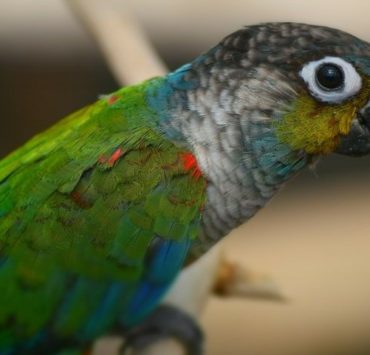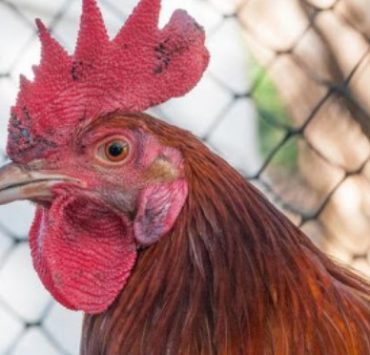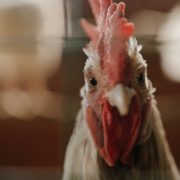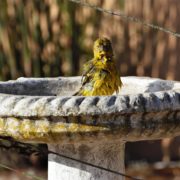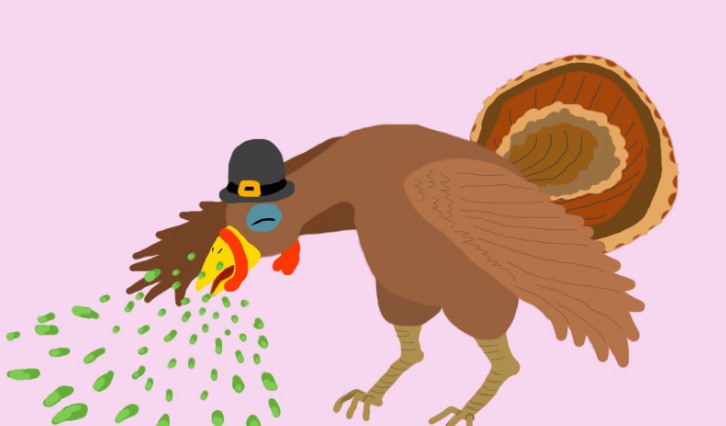
Survival of the fittest – this is the golden rule of nature. In the wild, it can be difficult to tell if a bird is sick. They do their best to maintain a strong appearance, especially in the presence of other animals, until their condition gets the better of them.
It’s no different with chicken or pet birds.
By the time your bird starts to show symptoms of illness, it has likely been sick for a while. Therefore, you need to learn how to recognize the subtle signs of a sick bird and get in touch with a bird vet before it is too late.
One of the most common sick bird symptoms you need to keep an eye out for is sneezing. While the occasional sneeze isn’t a cause for worry, any deviation from the norm might point to an underlying condition.
Here’s everything you need to know about diagnosing and caring for a sick bird.
Why Is My Chicken Sneezing?
While humans may suffer from colds and cases of flu from time to time, birds don’t. If your chicken is exhibiting cold-like symptoms like sneezing, coughing, and wheezing, you shouldn’t take this lightly. Without swift intervention, it may spread the illness to the rest of the birds in your flock.
A bacterial infection, known as Chicken Respiratory Disease (CRD), often causes sneezing and wheezing symptoms in poultry. This occurs when they’re exposed to Mycoplasma gallisepticum – the bacteria responsible for causing CRD.
In most cases, a chicken with a healthy immune system can sufficiently fight off these bacteria when exposed to them. However, some environmental triggers like stress, overcrowded living conditions, or even extreme temperatures may weaken their immune system allowing the disease to take root.
Aside from sneezing and wheezing, other symptoms of CRD include:
- Coughing
- Discharge from the nares and/or eyes
- Discoloration of the comb or wattle
- Lethargy
- Reduced appetite
- Reduced egg production
- Swelling around the beak and/or eyes
The best way to know for sure would be to listen to their chest. If you hear a congested, rattling sound when they breathe, that’s a positive indicator of respiratory disease.
If, on the other hand, your chicken has difficulty breathing, but doesn’t display any of the symptoms listed above, then it may be due to something else altogether, like gapeworm – for instance. Have a bird vet examine them to determine the root cause of their respiratory ailment.
How to Know if a Bird Is Sick
Remember, a bird will often pretend to be fine, especially if someone is nearby. Here are some tell-tale signs that your bird might be sick.
Any Signs of Blood
At the risk of stating the obvious, bleeding is never a good sign. If you notice any blood on your bird, the first thing you need to do is identify the source and stop the bleeding immediately.
If it’s because of a broken pin feather, you need to get a pair of pliers and pull it out. In other instances, you’ll need to apply some kind of styptic powder to the injured site. It works as a bleeding-stopping agent. If you don’t have the powder, cornstarch will do.
Even clipping your birdie’s toenails too short can induce bleeding. If that’s the case, and applying styptic powder doesn’t appear to be working, put cornstarch in a small container, insert the bleeding toenail, and hold it there for 15 minutes or so.
If the bleeding doesn’t stop, call your vet immediately.
Bad Posture When Resting
Birds generally have two resting postures:
- Untucked posture where their neck is fully retracted with their head resting on the breast and pointing forward
- Tucked posture where the neck is turned toward the back with their head tucked in the shoulder feathers
If you notice a change in the usual at-rest posture of your bird, it might be a sign that they’re unwell.
Changes in the Respiratory Tract Function
A bird should be able to breathe with minimal effort. Heavy labored breathing for extended periods after what would appear to be minimal exertion or while they’re at rest could point to a problem. Any wheezing or clicking sounds while breathing might also indicate an underlying issue.
Upper respiratory tract infections are surprisingly common in birds. You might notice a nasal discharge around the nares (nostrils). It may even cause conjunctivitis, characterized by a discharge around the eyes, reddened and swollen eyelids, partial closing of the eyes for prolonged periods, and frequent blinking.
Conjunctivitis might deteriorate further into sinusitis, which causes the area around the eyes to swell up. Keep in mind that identifying respiratory diseases in birds early on is important since the pus they produce isn’t in liquid form. It typically has a “cheesy” consistency and can build up in the sinuses, making it very difficult for the bird to breathe.
If they’re gasping with their mouth open, it’s a sign that they’re extremely ill and in need of urgent medical attention. Tail bobbing while breathing is also a common symptom of an impaired respiratory tract due to abdominal enlargement. This impairs the full expansion of the lungs or could point to primary respiratory disease.
Heart disease, an enlarged thyroid gland, or even goiter, could also cause breathing difficulty in birds.
Change in Temperament
If your usually-rambunctious bird suddenly becomes quiet and mellow, or your normally laid-back bird gets nippy and grouchy, they could be having a bad-feather day. Even changes in hormones may affect their mood. If this temperament goes on for a while, it may be because of something else altogether.
Changes in Bird Poop Appearance
This is arguably the most common sign of a sick bird. Anytime you’re cleaning out your bird’s cage or chicken coup, pay attention to the appearance of their poop.
If you notice runny or undigested feces (lumps where you can identify what the food was), this is usually a warning sign that something’s wrong. Even changes in the shape and color of the poop could point towards an underlying condition.
Keep in mind that a change in diet could change the appearance of their feces. Pellets, for instance, usually produce brownish poop, whereas seed diets may produce green-colored poop. Runny feces may result from a bird drinking too much water, although those effects don’t typically last for more than a few hours.
If you notice any changes in your bird’s droppings, take some sick bird poop pictures, share them with your vet, and they’ll tell you if you need to bring your bird in for a checkup.
Changes in Feather Appearance
Birds take pride in grooming their feathers. A healthy bird should have clean, sleek, and nicely preened feathers that lie close to the body. When a bird stops caring for its feathers, it is usually a sign of sickness. Here’s what you need to look out for.
- Dirty, tattered feathers: This could be due to “emotional upset,” mechanical damage if their cage is too small or if they were involved in a tussle with another bird, or lack of preening if they’re ill
- Dull or unnaturally banded feathers: A change in the luster or texture of your bird’s feathers could be the result of any number of illnesses, so you’ll need to get your vet to check them out as soon as possible
- Plucked feathers: This is often a sign of parasites, although it could also be a sign that your bird is bored
- Poop stuck to the feathers around the vent: This points to an infection of the digestive tract, or in some cases, abdominal enlargement due to a cyst or tumor
- Puffed up/ruffled feathers: A sick bird will usually ruffle their feathers for extended periods to trap warm air if they’re feeling cold
- Stained feathers around the nares: This is usually due to a nasal discharge (rhinitis), which points to illness
Changes in Their Eating Pattern
If your bird doesn’t finish their favorite food, it might be because they’re full. If it becomes a pattern and they go an entire day without eating, it might be because they’re sick.
Be sure to check that the bird is eating and not picking at the food cup or scooping seeds out of the dish and transferring them onto the floor. The health of a bird that’s not eating as it should due to an underlying condition may deteriorate quickly due to their rapid metabolic rate.
On the flip side, if your bird starts consuming too much grit, it’s often a sign of a gastrointestinal upset. This may lead to subsequent blockage/impaction.
The same applies to water. If your bird is drinking excessive amounts of fluid, it might point to a metabolic disorder of some sort, such as diabetes.
Changes in the Appearance of the Beak
A bird’s beak grows continuously throughout its lifetime and should wear down with normal activity. If this doesn’t happen, it may need to be trimmed from time to time. However, if it is growing faster than usual and looks abnormal, this is a strong indicator of illness.
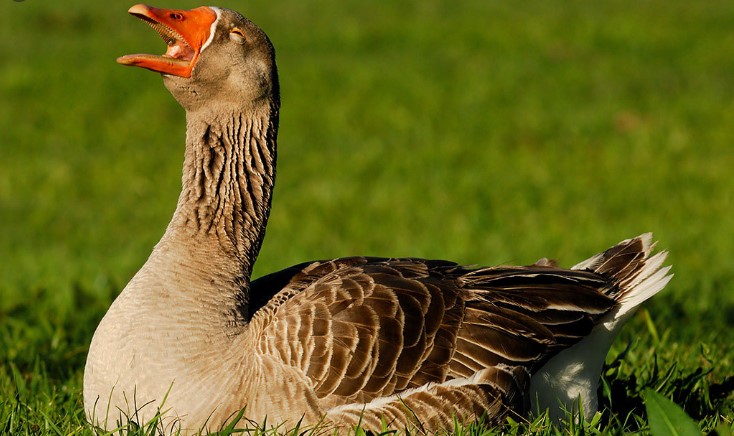
For instance, Budgies that are on an all-seed diet are usually prone to getting fatty liver disease. Symptoms include an overgrown beak, which deteriorates and forms brown/black spots due to hemorrhage.
You also want to check for any abnormal scaling, enlargement, or crustiness on the beak and around the mouth.
My Bird Is Sick What Can I Do – How to Treat a Sick Bird 101
If your bird is showing any signs of illness, the first thing you need to do is have a veterinarian examine it. Any bird that’s gravely ill will require hospitalization.
If it’s mildly affected and still eating, you can treat it yourself under your vet’s direction. How can I help my sick bird at home? Here are some useful tips to help with their recovery.
1. Administer the Medications as Directed
To give your bird a fighting chance at making a full recovery, you need to administer the prescribed medication as directed by your vet. Continue with treatment, even if the bird appears to be doing better.
Stopping medication prematurely may cause it to relapse, which inevitably necessitates a second, more vigorous round of therapy.
2. Keep Them Warm
Pets recover faster when their body temperature is on the higher end of their normal range (75 to 80°F). Keeping their environment warm stimulates their appetite, improves digestion, and boosts their immune system’s strength to fight off infection and recover quickly.
3. Don’t Change Their Sleep Cycle
Pet birds generally adapt to their owners’ sleep routines. However, as tempting as it may be to leave a light on at night to keep an eye on them, doing this would be counterintuitive.
Leaving the lights on throughout makes it hard for them to sleep, which, in turn, increases their stress levels. This gets in the way of making a speedy recovery.
4. Ensure They Eat and Drink
If you’re wondering what to feed a sick bird, just stick to their normal diet. Keep in mind, though, that they will need extra calories to boost their immunity, so notify your vet if your bird is not eating and drinking as they should. In such cases, hospitalization may be necessary for force-feeding.
5. Isolate Sick Birds
Finally, you need to separate your sick bird from the rest of the flock to not only reduce the chances of spreading the disease to the others but also to monitor their food and liquid intake as well.
Can Birds Make You Sick?
While this isn’t common, some specific bird diseases can be transmitted to their owners. The most common ones are chlamydiosis, which is brought about by the Chlamydia psittaci bacteria, and parrot fever. The good news is – they are both treatable.
Can Birds Make Dogs Sick?
Although most parasites like tapeworms and roundworms are species-specific, certain bacterial and fungal diseases are not. Some of the most common bird diseases that are known to infect canines include:
- Aspergillosis
- Chlamydiosis
- Cryptococcus
- Histoplasmosis
- Salmonella
If you have a sick bird in the house, now’s probably not the best time to bring in a new pet to the household.
Consult a Licensed Veterinarian
If your pet bird or chicken has any signs of illness, seek medical treatment for them as soon as possible to prevent their condition from deteriorating. The same applies to treatment. If it’s not going as well as you would expect, you need to notify your veterinarian as soon as possible.
For more information on your bird’s health, use our online Vet Chat to talk to any of our qualified avian veterinarians today.


